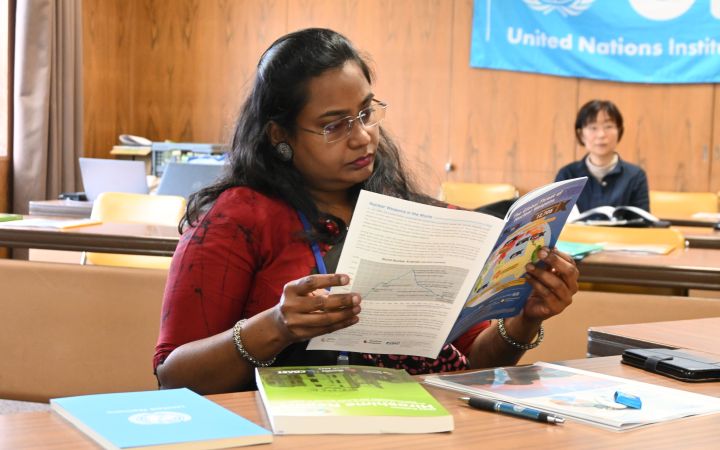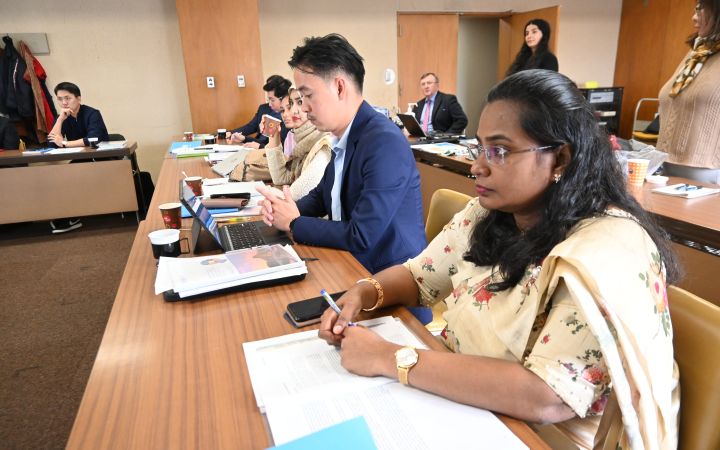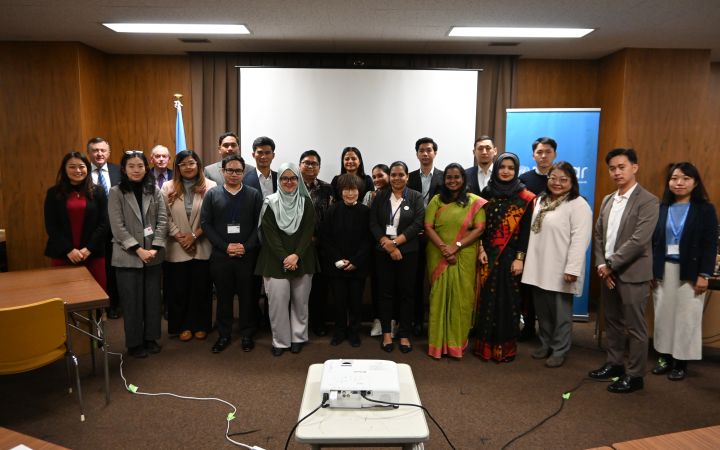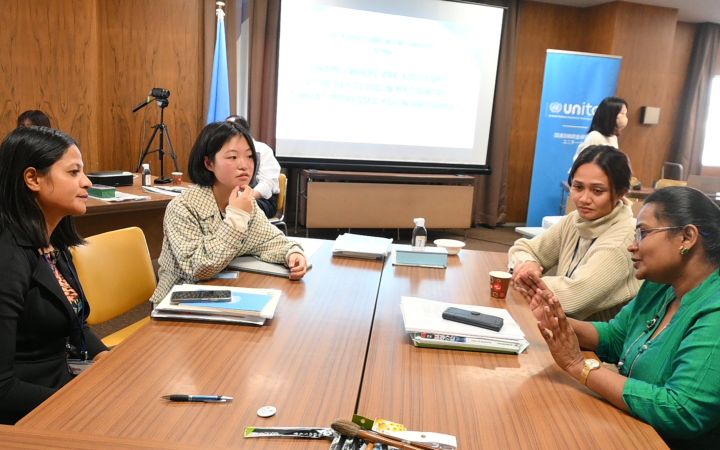- Prashanthi Krishnamoorthy, a Sri Lankan diplomat, enhanced her skills through the UNITAR Hiroshima Training Programme on Nuclear Disarmament and Non-Proliferation.
- Sri Lanka ratified the Treaty on the Non-Proliferation of Nuclear Weapons and acceded to the Treaty on the Prohibition of Nuclear Weapons.
- The training programme provided a combination of theoretical lectures with emotional site visits. It equipped Prashanthi with insights into nuclear disarmament, refined her skills for effective international negotiations, and affirmed her commitment to building peace.
13 August 2024, Hiroshima, Japan – Prashanthi Krishnamoorthy is the deputy director of the South Asia Division at the Sri Lanka Foreign Service, where she manages bilateral relations with India, Maldives and Pakistan. Prashanthi took part in the FY2023 UNITAR Hiroshima Training Programme on Nuclear Disarmament and Non-Proliferation to enhance her ability to support and advance global disarmament and non-proliferation efforts.
SRI LANKA: COMMITTED TO NUCLEAR DISARMAMENT
Prashanthi represents a country that has long been a committed and vocal supporter of nuclear disarmament and non-proliferation. Sri Lanka signed the Treaty on the Non-Proliferation of Nuclear Weapons (NPT) in 1968 and ratified it in 1978. The country also acceded to the Treaty on the Prohibition of Nuclear Weapons (TPNW) and has been legally bound by it since 18 December 2023.
Located in a region with two nuclear weapon states – India and Pakistan – and weighted by its own experience of prolonged internal conflict that lasted over two decades, Prashanthi believes Sri Lanka understands the critical importance of disarmament and non-proliferation.
“We very well know that war always brings nothing good. Even if you claim victory that would be a pyrrhic victory [a victory won at too great a cost]. It’s not something that you could rejoice upon.” —Prashanthi Krishnamoorthy, Sri Lankan diplomat
HIROSHIMA: THEORY WITH EMOTION
Amid ongoing global concerns about nuclear threats, Prashanthi joined 17 other government officials from 13 Asian and Pacific countries in Hiroshima, Japan, from 5 to 12 February 2024 for the UNITAR Hiroshima Training Programme on Nuclear Disarmament and Non-Proliferation. The programme aimed to enhance diplomats’ understanding of nuclear disarmament debates and equip participants with the skills to advance regional discussions on disarmament and non-proliferation.
As part of the training, participants visited the Atomic Dome and the Peace Museum at the Peace Memorial. The experience profoundly moved Prashanthi. The Peace Museum’s exhibits – like broken spectacles that had melted in the atomic blast – and listening to the stories of an atomic bomb survivor, marked by resilience and a message of peace despite immense personal loss, aligned with her experiences of prolonged conflict. The combination of emotional visits and theoretical lectures in a room with a view of the Atomic Dome left a lasting impact on Prashanthi and reinforced her commitment to nuclear disarmament.
For Prashanthi, Hiroshima is not just a place of historical tragedy but a beacon of peace, symbolizing the global need for nuclear disarmament and non-proliferation.
“They took us to the hypocenter, the epicenter of the bomb. I would say that this is becoming the epicenter from where peace emanates.” —Prashanthi Krishnamoorthy, Sri Lankan diplomat
The support of the Hiroshima Prefectural Government and Hiroshima City in training government officials in nuclear disarmament also impressed Prashanthi. In her view, their involvement underscores Hiroshima’s commitment to global peace, reinforces its message of peace and encourages all to join the collective effort towards disarmament.
LEARNING LESSONS OF EMPATHY AND RESILIENCE
Prashanthi enjoyed the diverse composition of participants in the programme, which included many women and representatives from developing countries. She feels their common background fostered a strong sense of camaraderie and understanding, helping to build a supportive, insightful and invaluable network of like-minded individuals. She was heartened to see the increasing women’s involvement in disarmament.
Prashanthi plans to apply her new skills and insights in her work to foster better bilateral and multilateral relations. She believes the programme’s emphasis on empathy and resilience will enhance her professional interactions and policymaking.
MAKING A POSITIVE IMPACT, NO MATTER HOW SMALL
Prashanthi’s personal goal is to be a good human being while balancing work and family life. As a diplomat, she must also balance national and personal interests with global responsibilities, navigating volatile situations with assertiveness and sensitivity.
The essence of their role as diplomats, says Prashanti, extends beyond mere representation of national interests. It is about making a positive impact, no matter how small, on individual lives and broader global issues.
“You may not be the Secretary-General of the UN, but still, being somebody in the world always you could create a change for betterment. And sometimes you or your little impact could change somebody else’s world.” —Prashanthi Krishnamoorthy, Sri Lankan diplomat
United Nations Online Volunteer Isuruni Rathnayaka contributed to this article.
About Unitar
The United Nations Institute for Training and Research (UNITAR) is a dedicated training arm of the United Nations. In 2022, UNITAR trained over 395,000 learners around the world to support their actions for a better future. In addition to our headquarters in Geneva, we have offices in Hiroshima, New York and Bonn and networks around the world.
The Division for Prosperity is based in the Hiroshima Office and Geneva. We seek to shape an inclusive, sustainable and prosperous world through world-class learning and knowledge-sharing services on entrepreneurship, leadership, finance and trade, digital technologies, and nuclear disarmament and non-proliferation. We empower individuals from least-developed countries, countries emerging from conflict, and small-island developing states – especially women and young people – to bring about positive change.





